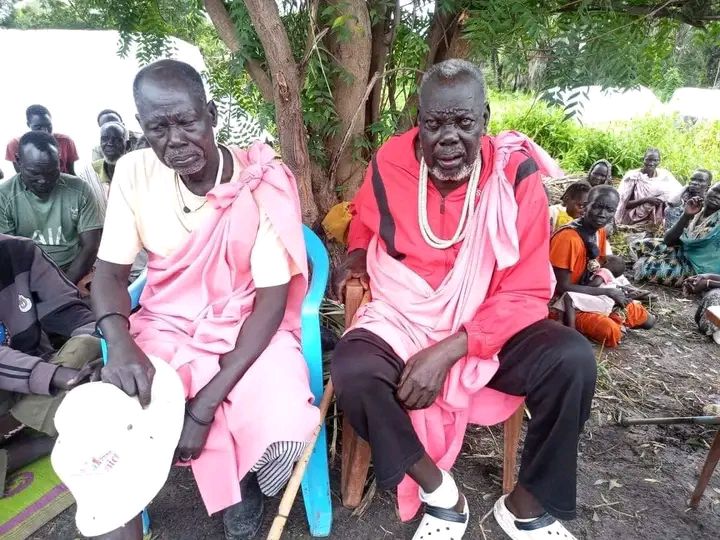You are here: Home | Humanitarian | News | States | Battered by Kitgwang violence, Panyikang IDPs in dire situation

Displaced civilians from Panyikang County sitting under tree. - Courtesy photo.
Civilians displaced by the recent Kitgwang factional fighting in Panyikang County of Upper Nile State, are in serious need of medicines and shelter, local officials said on Saturday.
The Commissioner of Panyikang County and a delegation from the state government visited the war-ravaged locality to assess humanitarian situation last week.
Mustafa Gai Lual said the government team launched humanitarian assessment in Adidhyang and Opai areas.
Speaking to the state-owned television SSBC on Friday, Gai appealed to humanitarian actors to intervene.
“Actually, what we can says to our brothers, is that we need the supports from every one. People are suffering here really, until the arrival of those NGOs who support with small things like drugs and shelter that they has now.”
In the last two months, fierce fighting erupted between armed factions of the Kitgwang groups, displacing thousands of people to the neighboring areas, including Ruweng and Abyei.
At least 27,000 people have been displaced by heavy fighting in Tunga and neighboring Panyikang County in Upper Nile State, a United Nations agency said last week.
The UN Office for Coordination of Humanitarian Affairs indicated that intensifying military clashes occurred between 14 and 15 August and extended further to Pakaw and Fangak County.
The flareup of violence followed July’s fighting in Panyikang County, between rival forces of General Simon Gatwech and General Johnson Olony.
The Commissioner of Panyikang previously called for calm following the fierce fighting, accompanied by heavy shelling.
For his part, the Director-General in the state Ministry of Health said the displaced are faced with a lack of food and shelter at a time of rainy season.
“Some NGOs who brought some shelter but is not enough ,secondly is the issue of diseases among the IDPs because there is no health facility here, but we have tried our best and we brought some drugs with us and we open emergency clinic here.”
Support Eye Radio, the first independent radio broadcaster of news, information & entertainment in South Sudan.
Make a monthly or a one off contribution.
Copyright 2024. All rights reserved. Eye Radio is a product of Eye Media Limited.